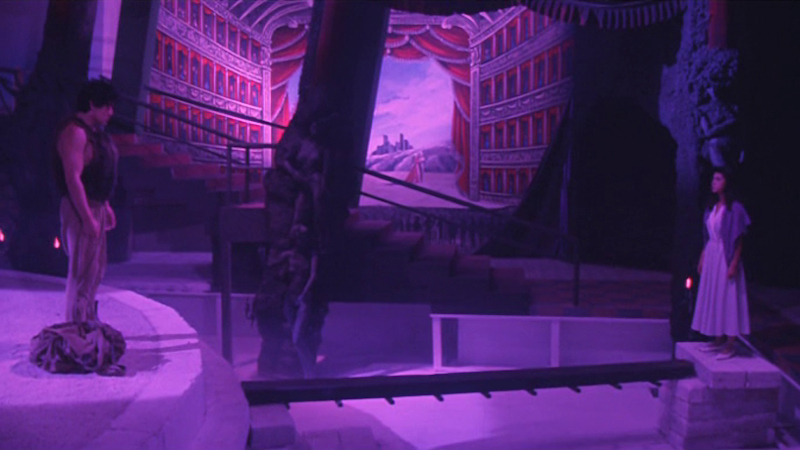Director – Shinji Somai – 1987 – Japan – Cert. 15 – 118m
*****
A Hokkaido farmer comes to Tokyo in search of his vanished fiancée but finds a world he has not expected – on Blu-ray from Monday, Monday, May 20th
At a rubbish tip on the outskirts of Tokyo, a barefoot man (Takeiji Muto) in cheap trousers and top encounters a suave-looking sophisticate (Kei Suma) and a woman opera singer (Michiru Akiyoshi), the latter performing gracefully atop the rubbish heap. The woman is dependent on the sophisticate. The barefoot man has travelled from Hokkaido to find his fiancée Kuriko Sakura, who was supposed to return after studying accounting to help him run a farm.
The sophisticate knows someone of that name, and drives the barefoot man into the city. In his nightclub, he offers the outsider a deal – if he’ll fight the club’s pro-wrestler for ¥100 000, the other will tell him where to find Kuriko. However, she may not be the person he seeks. Out of her boss’ earshot, the woman warns the outsider that the wrestling may be to the death.
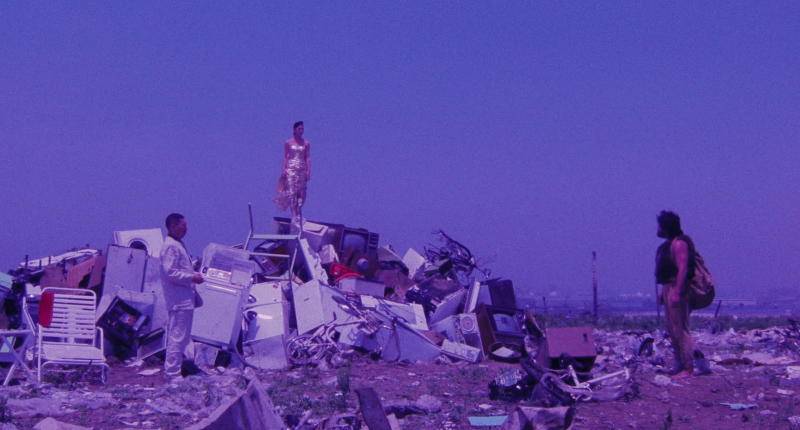
In the club she plays the piano while another woman sings opera and, on the circular dias bordered by a water pool, a challenger fights the incumbent wrestler and loses. Then it’s our man’s turn. It seems touch and go at first, but eventually he turns the tables and takes down the pro. Supplied with Kuriko’s whereabouts as promised, he finds her (Narumi Yasuda) serving at a private party. It is indeed the same person, but she doesn’t seem to want to come back to their town of Takinoue with Sen-chan, as she addresses him, while his requests for somewhere to stay are rebuffed – she shares her place with a flat mate, and there isn’t much room.
After another fight at the club, in which he sustains what may be a fractured rib, the piano player Yoshino starts to take an interest in him, although she’s less keen when he grabs her by the waist. The boss, finding her in Sen’s grasp, threatens to kill him should he lay hands on her again. It turns out she’s a former singer who has lost the ability to sing. Meanwhile, Sen befriends former club employee Akanuma (Hide Demon) on the bus, promptly thrown off the vehicle for bouts of coughing, who then shows Sen his current crash pad – an unoccupied building which “the master” is due to have renovated.
A visit to Kuriko’s flat revels the disturbing truth that she is engaging in drug-fuelled sex with the boss. It’s a far cry from Sen’s memories of the innocent and bight-eyed young thing to whom he proposed at a party in an abandoned bus back home. He drops the basket of goodies he has brought her and goes into the street, asking the first woman he meets to “be my wife” and flooring the men she’s hanging out with. She swiftly runs off.
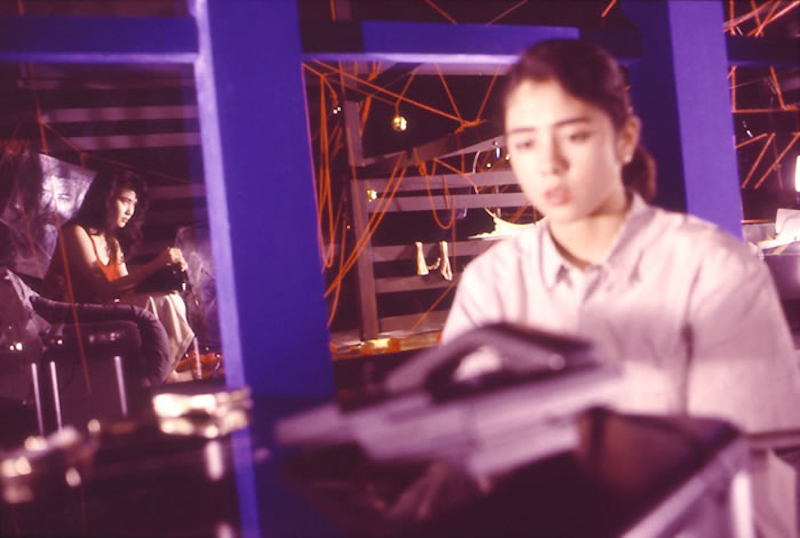
Kuriko phones the boss Shiriuchi and the pianist Yoshino picks up. Yoshino tells her about a boat ride she and Sen went on, and Kuriko tells Yoshino that Sen likes Yoshino and wants to marry her. Yoshino says she’s not the marrying kind.
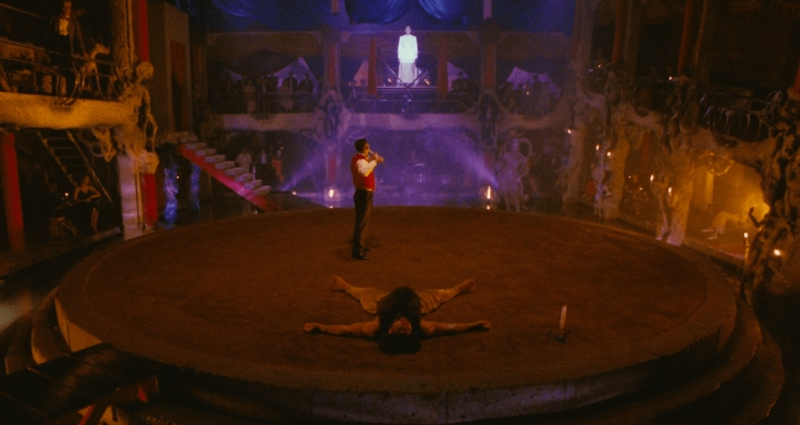
Later, Sen accuses Shiriuchi of staying on the sidelines and challenges him to a fight on the dias. However, it turns out that the boss is a highly proficient fighter, capable of beating him up with a pole while reciting erudite poetry. Kuriko later finds Sen in the street, where he claims he just wanted to see her. She offers him her body to do whatever he wants with, but when he again asked her to be his wife, it’s a step too far and she says goodbye.
Sitting in the street with Akanuma, he tries the same line on the passing Yoshino, who agrees if he can beat her in a swimming pool race. After he does so, which she didn’t expect, the pair engage in frenzied coitus in the emptied pool until they are interrupted by a bus catching fire outside – Akanuma has turned himself into a human torch. Sen has to be prevented by cops from entering the inferno to rescue his friend. His moves on Yoshino are later thwarted when, after she has started singing again inspired by his presence, Shiriuchi sends her to Italy to record with a record company. He tries to see her at a Tokyo concert, but she won’t have it. However, their separation stops her ability to sing. He voices primal screams in a winter blizzard, she walks to Takinoue in the Spring hoping to find him, instead running into a boy called Koichi who turns out to be the bereaved son of Akanuma.
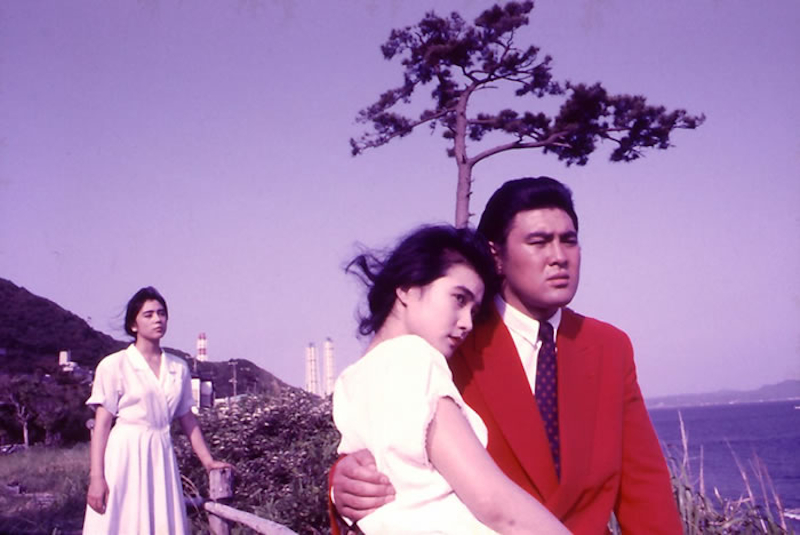
For the final reel, Sen outfits himself in a red suit from a Tokyo Louis Vuitton store and tracks down Kiriko, only to find her in a wheelchair regretting having abandoned the two most important things in her life – Sen and Takinoue. She is being visited by Yoshino, who warns him that Shiriuchi has a gun. He visits the latter in his club anyway, attacking him with a table before Shiriuchi can pull the trigger. A coda features Sen, Yoshino and Koichi working together on Sen’s Takinoue farm.
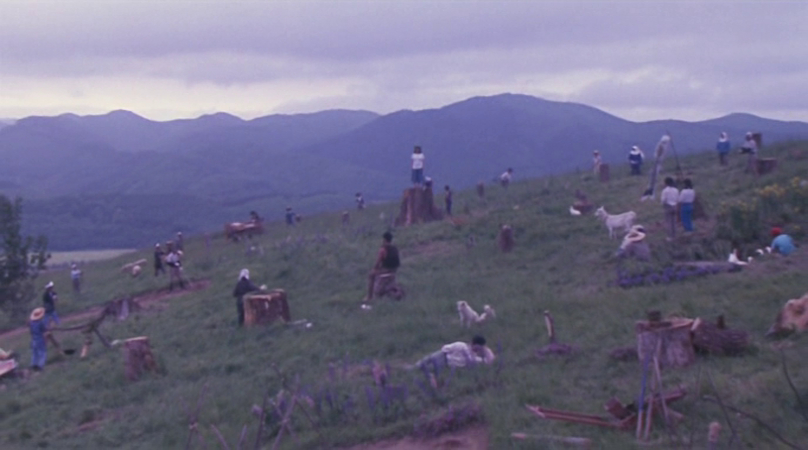
From its opening with Yoshino singing atop a rubbish tip to an ending where she similarly stands on the stump of a large, felled tree, there’s a dreamlike unreality to everything here. Perhaps it reaches its nadir in the scene with the bus fire, in which the interior engulfed in flame is captured by the camera as an aesthetically pleasing spectacle. The nightclub, where opera singers jostle with fighting combatants watched by enthusiastic, blood-hungry audiences, is even more surreal, so much so that when watching, you wonder what exactly you’ve let yourself in for.
At the centre of it all, Muto’s Sen is an enigmatic figure, a gentle giant whose idealised view of women is shattered by the harsh, exploitative realities of urban Tokyo life. He seems naive, yet his attachment to the land and the more friendly rural community of Takinoue gives him something that whose who have fully bought into life in Tokyo don’t have. In his fights in the club, he startles adversaries with impromptu somersaults, much as he startles the audience toward the end when he appears in his red suit.
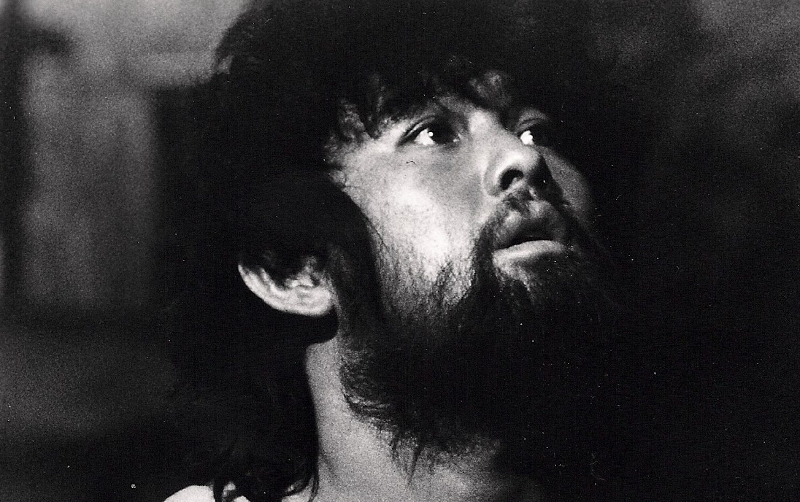
The two sex scenes which suddenly come out of nowhere – the voyeuristic watching of Kuriko through a gap in her wall as her head writhes around in states of ecstasy before we even glimpse the presence of a sexual partner in crime, the unexpected coupling of Sen and Yoshino in the emptied swimming baths pool – completely disrupt the narrative, forcing us to re-evaluate our readings of the characters involved.
And it’s not just the sex scenes – the whole film is similarly disrupting. The club is a peculiar mixture of jarring elements – wrestling to the death satisfying lowbrow bloodlust, opera songs catering for a highbrow cultural appetite, not to mention an ageing owner who turns out to be the best fighter in the place. And from the moment the fish-out-of-water Sen appears on the outskirts of Tokyo, the urban stage is set for a clash of rural and urban, naive and sophisticated, innocent and corrupt.

In this climate, the cast-off figure of Akanuma appears particularly prescient, embodying as he does the artist who practices his art as a compulsion until he can practice no more, in direct contrast to the club owner who can stage potentially lethal fights as gruesome and popular entertainment.
Shot on Agfa film stock, the palette is largely devoid of yellows, which in places gives the image a purple hue. This being a restoration and a beautiful, scratch-free print, I presume this is what the director and d.p. intended rather than a fault due to the film stock ageing. It certainly adds to the overall surreal feel.
I found myself completely overwhelmed by this remarkable film, very different in overall tone to the director’s slightly earlier, yet equally brilliant and extraordinary, Typhoon Club (1985).
Luminous Woman is out on Blu-ray in the UK on Monday, May 20th.
Trailer:
